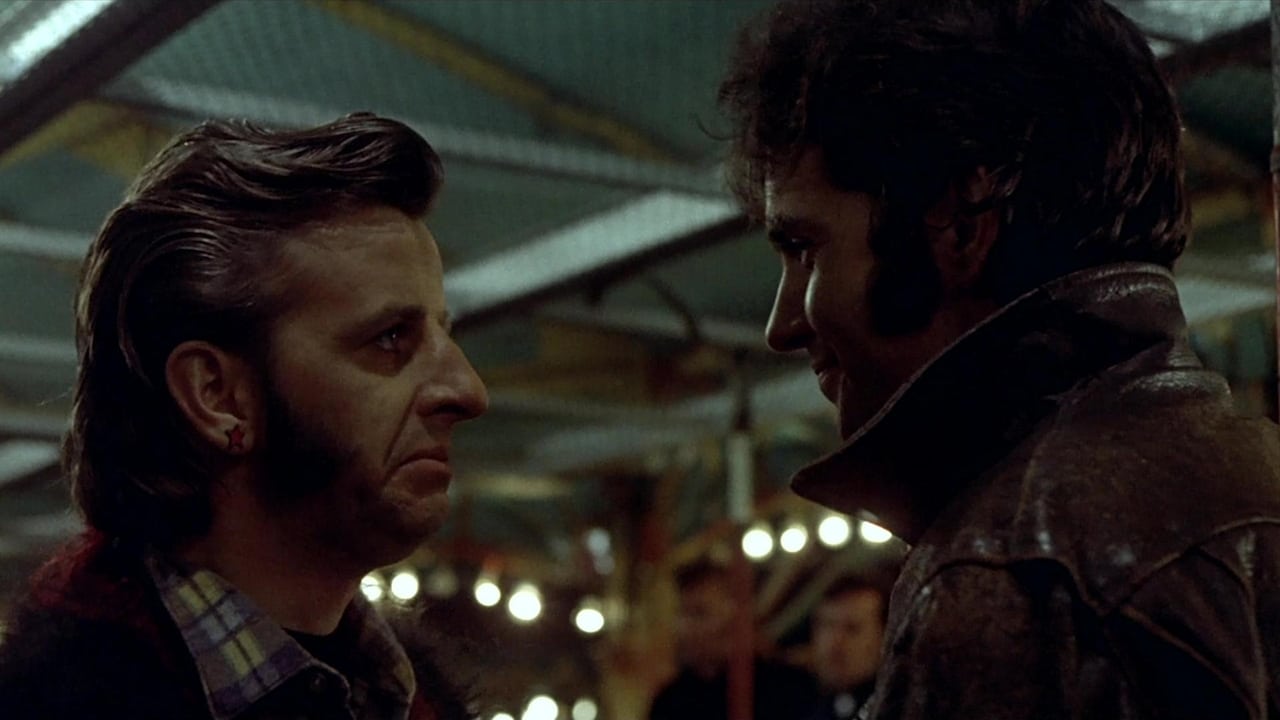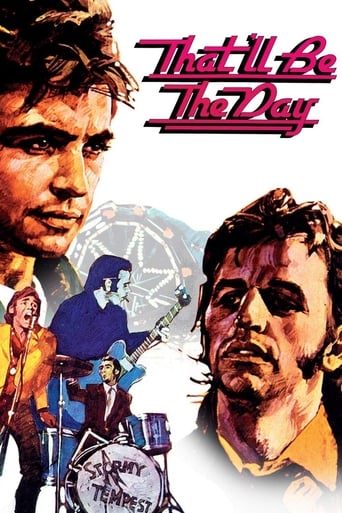

Very best movie i ever watch
... View MoreThere is, somehow, an interesting story here, as well as some good acting. There are also some good scenes
... View MoreWorth seeing just to witness how winsome it is.
... View MoreThrough painfully honest and emotional moments, the movie becomes irresistibly relatable
... View MoreRock 'n' Roll,Jazz and Skiffle.They were the musical choices facing teenage boys in the mid 1950s.The ones who spent a lot of time in their rooms reading quietly and listening to the wireless tended towards jazz,tortured intellectuals who who wanted to ban the bomb and carry washboards beneath their duffel coats preferred skiffle,and those with a healthy interest in sex picked up their Hofners and tried to knock out "Be -bop a Lula". Jim Mclaine certainly falls within the latter category and is a "Bad Boy" before his time.With an over - protective single mother,he drops out from his Grammar School and drifts around the south coast before taking up with a Funfair.Here he cements the reputation of fairworkers as careless Lotharios. Altrhough capable of charm when necessary,he is in fact rather an unpleasant boy whose rejection of his mother is reflected in his conduct towards his sexual conquests. Mr D.Essex manages the difficult task of portraying both sides of his character and making them seem convincing. The movie rather sweetly captures the era of Post - Suez optimism when we could ride our bicycles around the streets without being shot at by warring gangs and hang around town centres without being watched warily by policemen in full body armour carrying gas spray cans. Jim wants to be a rock'n'roll star and makes the irrevocable step in the last scene of the movie where he goes into a music shop and is handed a guitar. Of course it turned out that rock'n'roll was not here to stay after all and only ageing ex - Teds and OAP bikers listen to Jim's kind of music any more as it proceeded to morph into "Rock" and all its sub - divisions of guitar widdle. To see how Jim coped (or failed to cope) with that you must watch "Stardust",the brilliant follow - up to this movie,but "That'll be the day" - in its own right - is a highly enjoyable movie and a wallow in nostalgia for those of us who wish it was still 1958.
... View MoreThis British film came out in 1973, the same year as the better-known American film "American Graffiti". There was evidently a fashion in the seventies for looking back at the late fifties and early sixties, even though only about 10-15 years separated the two eras. The qualifying period for nostalgia seems to have got longer in recent years: I cannot imagine a film made today looking back in the same way at 1998 or even 1993.We first meet the main character, Jim MacLaine, as a grammar school boy in the late fifties. Jim's working-class background might today be called "disadvantaged", especially as he comes from a single-parent family, something rarer then than today. We learn how Jim's father walked out on the family when he was a child, but Jim's mother has worked hard to keep the family together, and hopes that her son, who is academically able if lazy, will go to university.Jim, however, has other ideas. A life of study is not for him. On a whim, he drops out of school and runs away from home, not knowing what he wants to do with his life. He finds work on the Isle of Wight as a deckchair attendant, at an amusement arcade and a holiday camp. (The island is known for its holiday resorts, but in the early seventies it was best known for pop festivals, which gained it a reputation as the British Woodstock. This may explain why it was chosen as a setting for a film in which rock music plays an important part). Although Jim dreams of becoming a rock star he does not attempt to realise that dream until the final scene where we see him buying a guitar. (The story of his subsequent musical career is told in the sequel, "Stardust").Jim's main preoccupation during his life on the Island is casual sex; his good looks make him attractive to women, and he has a number of one-night stands. He eventually returns home and gets married, without giving up his womanising ways; on the night before his wedding he cheats on his fiancée, Jeannette, with the girlfriend of his best friend, and best man, Terry. Terry, a university student who prefers trad jazz to rock, represents the steady, middle-class lifestyle which Jim has rejected.I note that one reviewer refers to the film's "wonderfully nostalgic timeline" whereas another calls it "defiantly anti-nostalgic". Both descriptions are, in a way, correct. In one sense the film is anti-nostalgic. In 1973 there were certainly some people who looked back at the Macmillan years as the "never had it so good" era, but the makers of this film were not among them. The look of the film, although it is in colour rather than black-and-white, is deliberately based on the "kitchen sink" realist films of the late fifties and early sixties such as "Woman in a Dressing Gown" or "Saturday Night and Sunday Morning". The emphasis is on drabness and seediness with much of the action taking place in cramped, squalid, badly-furnished and ill-lit houses and lodgings. (Another British film from this period, Richard Fleischer's "10 Rillington Place" from two years earlier, achieves a similar look).In another sense, however, the film does look back nostalgically at the fifties. Those like Terry who hoped that rock would prove no more than a passing fad and that jazz would make a comeback were to be disappointed. By the seventies rock and pop were the dominant element in popular music, especially among the young; jazz had become a minority interest. The film can be seen as a celebration of the early years of rock-and-roll, a time which saw the birth of a new, exuberant youth culture as young people started to assert tastes in music and fashion which were quite different to those of their elders. In that sense at least, the teenagers of the late fifties had "never had it so good". We seem to hear just about every well-known pop single from the period on the soundtrack; the title is, of course, taken from the Buddy Holly song. David Essex plays Jim, and several other musicians, including Ringo Starr, Billy Fury and Keith Moon, have supporting roles.Ringo, like his fellow Beatles, never made a serious attempt at an acting career, but does enough here, as Jim's friend Mike, to suggest that he might have had a good chance of success had he done so. Rosemary Leach is also good as Jim's strong-minded mother. The film as a whole, however, never really works for me, for two reasons. The first is that the plot tends to become dull and repetitive, little more than a catalogue of Jim's sexual conquests. The second reason is the miscasting of the main role. Essex was one of Britain's top pop stars of the seventies, but had little previous acting experience, so seemed an odd choice for a film where he was not required to sing. Moreover, he seems to misunderstand his character, relying heavily on looks and charm and playing Jim as a likable Jack-the-lad, whereas in reality he is a complete bastard.There are similarities between Jim and another heartless cinema Lothario, Michael Caine's Alfie, but at least the latter is never guilty of rape, unlike Jim who forces a schoolgirl to have sex after she has made it clear that she is unwilling. (Even the normally cynical Mike is shocked by this episode). Whereas Alfie finally comes to have doubts about his lifestyle ("What's it all about?"), Jim remains an unrepentant cad to the end, abandoning Jeannette and their young child to take up his new pop career. Caine, a much more accomplished actor, is able to make us understand Alfie, even if we do not exactly like him. Essex is never able to do the same for Jim. 5/10
... View Moreespecially about "Stardust" As much as I admire "That'll be the Day", the sequel is even better, one of the finest movies about rock music ever made, yet it has never been released on video in any form (at least in the US). It's on my "most wanted list".For those who haven't seen it, it plays on the rock star mythology only hinted at by the final scene of "That'l be the day" and shows Jim's hedonistic rise as a musician, his career encapsulating both the ambitions and the pretensions of the period. Surprisingly - oh, I guess this counts as a "spoiler' - Connolly and crew didn't leave much room for a trilogy here.
... View MoreSet in post austerity Britain of the 1950's,this film brings alive the feeling and the vibe of that time vividly to to the screen.David Essex plays( or underplays )the laconic hero Jim Mclean.Jim's a bright boy but stepping on to the career ladder holds no interest for him.Rock'n'roll has broken through and for Jim there's only one vocation in life.To rock'n'roll.The film perfectly captures the staid,constraint and carefree days of Britain in the 1950's.Along with a great soundtrack Jim makes the break from home and sets out to find his dream.He finds it a tough world out there but eventually finds work in a holiday camp.Here he meets Mike (brilliantly played by Ringo Starr) who's been there, seen it,done it or so he claims.Mike introduces Jim to the ways of the adult world,so therefore throwing of the constrictions of the social strait-jacket that was '50's Britain.The strong point of the film is it's realism.Why have I never heard of it's directors' other work? One of the best British films of the 1970's;this is a must see for film fans and rock'n'roll fans alike.It's sequel 'Stardust' which charts Jims rise to fame should not be mentioned in the same breath.
... View More